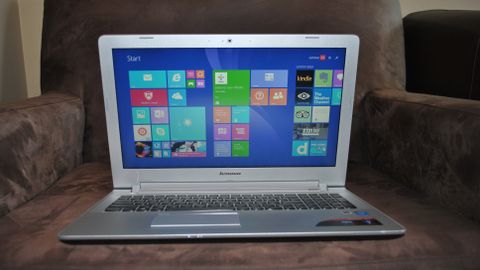Why you can trust TechRadar
At 15.12 inches wide (38.6cm) and 5.07 pounds (2.26kg), the Z51 is mammoth in comparison to both the ZenBook and the Aspire, both of which weigh 2.6 pounds (1.17kg) and 4.4 pounds (1.99kg), respectively.
But keep in mind, this laptop is built for students and entertainment junkies. It's not meant to be tossed inside a knapsack and forgotten about until you need to Google something. It's meant to be big, to make loud noises and to leave an impression. It succeeds at all three.
Here is the Lenovo Z51 configuration sent to TechRadar for review:
Spec sheet
- CPU: 2.1GHz Intel Core i5-5200U (dual-core, 3MB Cache, up to 2.70 GHz Turbo Boost)
- Graphics: Intel HD Graphics 5500
- RAM: 8GB DDR3L (1,600MHz)
- Screen: 15.6-inch, 1,920 x 1,080
- Storage: 1TB 5400 RPM + 8GB SSHD
- Ports: 2 x USB 3.0, 1 x USB 2.0, HDMI-out, 4-in-1 card reader, Audio combo jack, RJ-45, VGA
- Connectivity: Wi-Fi 802.11 a/c, Bluetooth 4.0
- Camera: 1MP webcam
- Weight: 5.07 pounds
- Size: 15.12 x 10.43 x 0.97 inches (W x D x H)
Being a bulky laptop, you're not missing much in terms of connectivity or storage. You can safely purchase this device knowing it can store a massive amount of data locally, all while connecting to your favorite external devices either for entertainment, educational or expansion purposes.
The fifth generation Intel Core i5 processor should be powerful enough to help you conduct multiple CPU-draining tasks at once, but more on that in a moment. The device even comes with an optical drive – something you don't see very often these days (mostly because they're not really necessary). But kudos to Lenovo for having you covered however and whenever you need to be.
Value
The Acer Aspire V7 starts at $799 (£469 or AU$1,299), or about $200 more than the Z51 unit sent to TechRadar. That extra $200 provides you with a bit more portability, a bit less style and a lot better performance.
Alternatively, the ZenBook ($699, £401, AU$902) is only $99 more expensive than the Z51, with comparable performance, an equally attractive design, but fewer inputs and a lot less versatility in terms of ports and storage.
Performance
If you can't already tell, I was well on my way to giving the Z51 a stellar review. I like its looks, its accessibility and the way it feels, but what good is a Corvette if its engine sputters?
Here's how the Lenovo Z51 performed in our suite of benchmark tests:
- 3DMark: Ice Storm: 40,779; Cloud Gate 4,228; Fire Strike: 549
- Cinebench CPU: 238 points; Graphics: 20 fps
- PCMark 8 (Home Test): 2,153 points
- PCMark 8 Battery Life: 2 hours and 31 minutes
Compared to the Acer Aspire V7, which runs on a previous generation Intel Core i5 processor, the Z51 got whalloped, scoring almost five thousand fewer points than the Aspire. The same can be said of the Cloud Gate test, on which the Z51 scored 1,000 fewer points than the Aspire. Even more extreme were the results of the Fire Strike test, which proved the Aspire to be almost three times as capable as the Z51 to perform taxing productivity tasks.
If we relegate the Z51 and its Core i5 processor to a subdivision to compete against laptops packing an inferior Intel Core M processor, you'd think we'd see a marked improvement in head-to-head matchups. Not so much.
The Z51 beat the Asus ZenBook and its Core M chip by a little more than 100 points on the Cloud Gate test. Both units registered the exact same score on the Fire Strike test. What's shocking is that the Z51 actually produced fewer frames per second on the Cinebench graphics test, despite the ZenBook having a weaker Intel HD Graphics 5300 card, compared with the Z51's 5500 card.
The tests were run twice and scores were in-range each time. We double-checked with Lenovo to make sure these scores were in-line with their internal tests, just to ensure there were no glitches. Lenovo's scores were slightly higher, but nothing to suggest this unit was damaged in any way.
Battery life
As you can see from the PCMark 8 Battery Life test, the Z51 isn't built to run all day without a charge. The 2 hours and 31 minute score attributed to the laptop is about an hour shy of what I was able to achieve playing Guardians of the Galaxy on a loop.
When performing basic business tasks, such as spreadsheeting, chatting and flipping between about a dozen open browsers, the laptop performed better than its benchmarks indicated, but the laptop only lasted about 3 hours.
For the sake of comparison, the Acer lasts for 5 hour and 32 minutes. The ZenBook lasts for about 5 hours. So, if battery life is your main concern, you'll probably want to avoid the Z51 at all costs.

